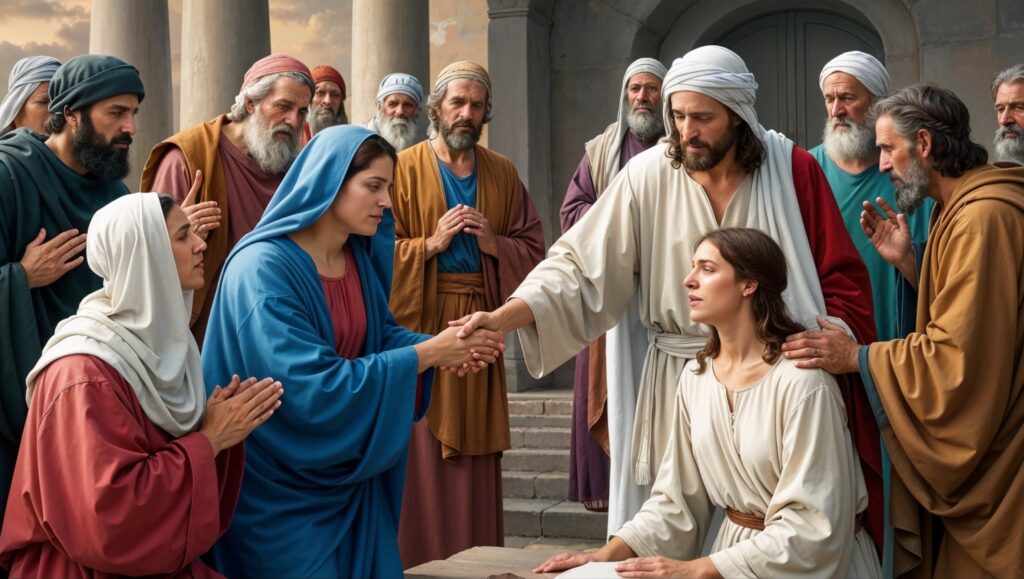Forgiveness is a cornerstone of the Christian faith, a divine act that invites us to reflect God’s grace in our lives. It is both a challenge and a blessing, requiring us to release the pain of offenses while trusting God to heal our hearts. In 1 Peter 3:11, we are called to actively seek peace and pursue it—a pursuit that often begins with forgiveness. To forgive is not to condone or forget the wrongs done to us but to choose freedom over bitterness, healing over hurt, and love over anger.
1 Peter 3:11 The New International Version
They must turn from evil and do good;
they must seek peace and pursue it.
The Call to Forgive
Peter’s words in this verse echo the teachings of Jesus, who emphasized forgiveness as an essential part of following Him. Forgiveness is not optional for believers; it is a reflection of God’s love and mercy. On the cross, Jesus prayed for those who crucified Him, saying, “Father, forgive them, for they do not know what they are doing” (Luke 23:34). This profound act of grace demonstrates that forgiveness is not about whether someone deserves it—it is about embodying God’s character.
To “seek peace and pursue it” is an active command. Forgiveness requires intentionality; it demands that we turn away from the temptation to hold grudges and instead move toward reconciliation. While forgiveness does not erase the pain or justify the wrong done, it releases us from the burden of anger and entrusts justice into God’s capable hands.
Why Forgiveness Matters
Forgiveness is transformative, both spiritually and emotionally. Here are some reasons why it matters:
1. It Reflects God’s Grace:
- Forgiveness mirrors God’s nature. Ephesians 4:32 reminds us to “be kind and compassionate to one another, forgiving each other, just as in Christ God forgave you.” When we forgive, we participate in God’s redemptive work in the world.
2. It Brings Inner Healing:
- Resentment can become a heavy weight on our hearts. By forgiving, we free ourselves from the chains of bitterness and allow God’s peace to fill our souls (Philippians 4:7).
3. It Restores Relationships:
- Forgiveness opens the door for reconciliation and deeper connections with others. It creates space for trust and love to flourish.
4. It Honors God:
- Choosing forgiveness aligns with God’s will and brings glory to His name. Romans 12:19 reminds us to leave vengeance to Him, trusting His perfect justice.
5. It Leads to Freedom:
- Unforgiveness keeps us trapped in anger and pain. Forgiveness liberates us, allowing us to move forward with joy and purpose.
Practical Steps to Embrace Forgiveness
Forgiving someone—or even yourself—can feel like an impossible task at times. However, with God’s help, it becomes achievable. Here are some steps you can take:
1. Acknowledge Your Pain
- Begin by recognizing the hurt you’ve experienced. Suppressing your emotions can hinder true healing. Bring your pain before God in prayer.
2. Pray for Strength
- Forgiveness requires supernatural strength that only God can provide. Ask Him to soften your heart and guide you through the process.
3. Make a Decision
- Forgiveness is a choice, not a feeling. Decide to forgive out of obedience to God, even if your emotions haven’t caught up yet.
4. Release Resentment
- Let go of any desire for revenge or repayment. Trust that God will handle justice in His perfect timing (Romans 12:19).
5. Seek Reconciliation When Possible
- If it is safe and appropriate, take steps toward restoring the relationship with the person who hurt you.
6. Reflect on God’s Forgiveness
- Remember how much you have been forgiven by God (Matthew 18:21-35). Let this truth inspire you to extend grace to others.
Biblical Examples of Forgiveness
The Bible offers countless examples of forgiveness that inspire us:
- Joseph: After being betrayed by his brothers, Joseph chose forgiveness over revenge (Genesis 50:20-21). His grace brought healing and unity to his family.
- Jesus: On the cross, Jesus forgave those who crucified Him (Luke 23:34), showing us that forgiveness transcends even the greatest injustices.
- The Prodigal Son’s Father: The father welcomed his wayward son back with open arms, demonstrating unconditional love and forgiveness (Luke 15:11-32).
These stories remind us that forgiveness is not about fairness—it’s about grace.
Pursuing Peace Through Forgiveness
Peter’s call in 1 Peter 3:11 challenges us to actively seek peace through forgiveness. Peace doesn’t happen passively; it requires effort and intentionality. When we choose forgiveness, we break cycles of anger and retaliation, paving the way for healing and restoration.
Jesus affirms this in Matthew 5:9 when He says, “Blessed are the peacemakers, for they will be called children of God.” By forgiving others, we reflect our identity as children of God and participate in His mission of reconciliation.
Read More About This Devotional
Words of Wisdom: The Choice to Forgive: A Path to Spiritual Renewal
Quote of the Day: “Commit to making all the adjustments necessary for your journey to be victorious”
Encouragement for Your Journey
If you’re struggling with forgiveness today—whether toward someone else or yourself—know that you don’t have to face this journey alone. Philippians 4:13 reminds us that “I can do all things through Christ who strengthens me.” Lean on His strength as you take small steps toward letting go of resentment.
Forgiving doesn’t mean forgetting or excusing what happened; it means choosing freedom over bitterness and trusting God with your pain.
Scripture Reading for the Day
Genesis 48 The New International Version
Manasseh and Ephraim
1 Some time later Joseph was told, “Your father is ill.” So he took his two sons Manasseh and Ephraim along with him. 2 When Jacob was told, “Your son Joseph has come to you,” Israel rallied his strength and sat up on the bed.
3 Jacob said to Joseph, “God Almighty appeared to me at Luz in the land of Canaan, and there he blessed me 4 and said to me, ‘I am going to make you fruitful and increase your numbers. I will make you a community of peoples, and I will give this land as an everlasting possession to your descendants after you.’
5 “Now then, your two sons born to you in Egypt before I came to you here will be reckoned as mine; Ephraim and Manasseh will be mine, just as Reuben and Simeon are mine. 6 Any children born to you after them will be yours; in the territory they inherit they will be reckoned under the names of their brothers. 7 As I was returning from Paddan, to my sorrow Rachel died in the land of Canaan while we were still on the way, a little distance from Ephrath. So I buried her there beside the road to Ephrath” (that is, Bethlehem).
8 When Israel saw the sons of Joseph, he asked, “Who are these?”
9 “They are the sons God has given me here,” Joseph said to his father.
Then Israel said, “Bring them to me so I may bless them.”
10 Now Israel’s eyes were failing because of old age, and he could hardly see. So Joseph brought his sons close to him, and his father kissed them and embraced them.
11 Israel said to Joseph, “I never expected to see your face again, and now God has allowed me to see your children too.”
12 Then Joseph removed them from Israel’s knees and bowed down with his face to the ground. 13 And Joseph took both of them, Ephraim on his right toward Israel’s left hand and Manasseh on his left toward Israel’s right hand, and brought them close to him. 14 But Israel reached out his right hand and put it on Ephraim’s head, though he was the younger, and crossing his arms, he put his left hand on Manasseh’s head, even though Manasseh was the firstborn.
15 Then he blessed Joseph and said,
“May the God before whom my fathers
Abraham and Isaac walked faithfully,
the God who has been my shepherd
all my life to this day,
16 the Angel who has delivered me from all harm
—may he bless these boys.
May they be called by my name
and the names of my fathers Abraham and Isaac,
and may they increase greatly
on the earth.”17 When Joseph saw his father placing his right hand on Ephraim’s head he was displeased; so he took hold of his father’s hand to move it from Ephraim’s head to Manasseh’s head. 18 Joseph said to him, “No, my father, this one is the firstborn; put your right hand on his head.”
19 But his father refused and said, “I know, my son, I know. He too will become a people, and he too will become great. Nevertheless, his younger brother will be greater than he, and his descendants will become a group of nations.” 20 He blessed them that day and said,
“In your name will Israel pronounce this blessing:
‘May God make you like Ephraim and Manasseh.’”So he put Ephraim ahead of Manasseh.
21 Then Israel said to Joseph, “I am about to die, but God will be with you and take you back to the land of your fathers. 22 And to you I give one more ridge of land than to your brothers, the ridge I took from the Amorites with my sword and my bow.”



